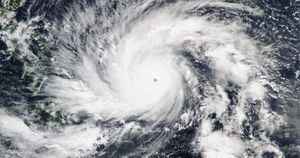Ukraine is grappling with the fallout from another extensive barrage of missile attacks on its energy infrastructure by Russia, as reports pour in of widespread disruption and damage across the country. On November 28, 2024, officials confirmed what they termed as one of the most significant assaults to date on Ukraine's already beleaguered energy grid.
The Ukrainian Energy Minister, German Galushchenko, took to social media to report the severity of the situation, stating, "Energy infrastructure is once again targeted by the enemy’s massive strike." This statement set the tone for the day's grim news, indicating the continuing pattern of assaults on Ukraine's energy capabilities.
Following the attack, emergency power outages were implemented across several regions, including the capital, Kyiv. The national electricity grid operator, Ukrenergo, announced these emergency measures as the missile onslaught left hundreds of thousands without power. The private energy company DTEK confirmed the outages affecting not just the capital but also regions including Odesa, Dnipropetrovsk, and Donetsk.
Throughout the attack, areas such as the western Rivne region and the city of Kharkiv faced direct hits, resulting in widespread damages. Specifically, Ukrainian officials reported approximately 280,000 people lost power during the missile strikes and additional negative effects such as reductions to water supply across affected regions. Kharkiv's governor mentioned damage to both business facilities and residential buildings, raising serious concerns about the safety of citizens.
The launch came on the heels of seven prior significant strikes on Ukraine's energy sector since the onset of the conflict, igniting fears among residents about potential prolonged outages as winter sets in. With temperatures dropping, the stakes could not be higher for Ukrainians striving to keep their homes warm and lights on.
President Joe Biden expressed outrage over the attacks, ensuring continued U.S. support for Ukraine. On the same day, he underscored the urgency of providing aid, asserting, “This attack is outrageous and serves as another reminder of the urgency and importance of supporting the Ukrainian people.” His administration has earmarked air defense systems and other military supplies as part of the strategic assistance aimed at bolstering Ukraine's defenses.
Biden's commitment was echoed by defense analysts who warned of the increasing reality of extended power outages as part of the attacks' devastating effects. While the head of Ukraine’s energy ministry noted the efforts by local energy professionals, the situation remains precarious, and citizens are bracing for another tough winter.
The aftermath of Russia’s missile strikes has erupted not only concerns about immediate national security but also the functioning of Ukraine's key infrastructures. The missile strikes targeted both energy facilities and local municipalities, amplifying fears of imminent humanitarian crises amid the harsh winter.
Russian authorities, on their part, claimed their military operations were intended to strike energy facilities supporting Ukraine’s military capabilities. Such assertions only fuel the international community's concerns about the larger humanitarian toll of the conflict, especially against the backdrop of rolling blackouts and energy shortages likely to prevail as temperatures fall.
Ukrainian President Volodymyr Zelensky has consistently underscored the pressing need for international cooperation and support amid these attacks. He described the Russian regime as one embodying “absolute evil” and urged collective unity against such aggression. On social media, he reiterated his sentiments of defiance and the need for solidity among nations, asserting, “We need unity, the world needs unity. Only together can we stop this evil.”
Adding to the narrative of grievance and resilience, Maxim Timchenko, CEO of DTEK, articulated the dire need for enhanced air defense systems from allied nations, which he stated could significantly mitigate the damage from such assaults. It’s clear from his remarks how much reliance Ukraine has on the support provided by international allies.
Poland, on the vigilance front, also heightened its military readiness, scrambling its air force as precautionary measures throughout the day. This act signals the broader regional ramifications of the Russian military actions, drawing neighboring countries closer to the conflict.
News sources have reported at least seven casualties connected to these air strikes, with many others injured as the attacks unfolded throughout Ukraine. This harrowing toll serves to exemplify the extensive human cost of the prolonged conflict, underlining the desperate pleas for peace amid increasing violence.
Against the backdrop of these air strikes and the resulting infrastructure damage, the mood among Ukrainians has shifted from one of concern to outright determination. Individuals and communities are banding together, utilizing available resources to weather the storm. Nevertheless, officials continue to monitor and report on infrastructure damage, keeping the public informed of developments and safety measures.
The conflict and these recent developments serve as reminders of the continuing volatility of the region. With winter now upon Ukraine, the resilience of its people and the ever-increasing need for international support remain high on the agenda.
The increased urgency for both strategic and humanitarian assistance is echoing through various government statements and public outreach initiatives, highlighting just how interconnected the political and civilian spheres have become during this significant moment of strife.



